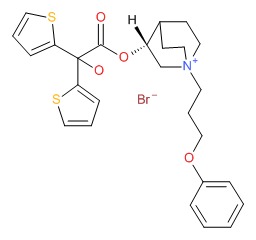NCBI Bookshelf. A service of the National Library of Medicine, National Institutes of Health.
LiverTox: Clinical and Research Information on Drug-Induced Liver Injury [Internet]. Bethesda (MD): National Institute of Diabetes and Digestive and Kidney Diseases; 2012-.

LiverTox: Clinical and Research Information on Drug-Induced Liver Injury [Internet].
Show detailsOVERVIEW
Introduction
Aclidinium is a synthetic anticholinergic agent that is used as an inhalant for treatment of acute bronchospasm due to chronic bronchitis or emphysema. Aclidinium has not been implicated in causing liver enzyme elevations or clinically apparent acute liver injury.
Background
Aclidinium (a" kli din' ee um) is a synthetic quaternary ammonium anticholinergic which inhibits the muscarinic actions of acetylcholine on autonomic nerve endings, decreasing bronchial smooth muscle contractions and alleviating bronchospasm in patients with chronic obstructive pulmonary disease (COPD). Aclidinium has potent activity against muscarinic acetylcholine type 3 (M3) receptors which are found in bronchial smooth muscle. Aclidinium is rapidly hydrolyzed in plasma, so that any actively absorbed drug is unlikely to cause major systemic side effects. Its quaternary ammonium structure also decreases its ability to cross lipid membranes such as the blood brain barrier. Aclidinium was approved for use in the United States in 2012 as a respiratory inhalant and indications include maintenance treatment of bronchospasm associated with chronic bronchitis and emphysema. Aclidinium is available in a dry powder inhaler under the brand name Tudorza Pressair. The typically recommended dose in adults is 1 inhalation (400 mcg) twice daily. The common side effects of typical anticholinergic agents (such as dryness of the mouth and eyes, decreased sweating, visual blurring, constipation, urinary retention, impotence, tachycardia and palpitations, anxiety and restlessness) are uncommon in patients treated with aclidinium by inhaler. Aclidinium use can cause paradoxical bronchospasm. Anticholinergic agents can precipitate acute narrow angle glaucoma and acute urinary retention.
Likehood score: E (unlikely cause of clinically apparent liver injury).
Hepatotoxicity
Like other anticholinergic agents, aclidinium has not been linked to episodes of liver enzyme elevations or clinically apparent liver injury. A major reason for its safety may relate to the low systemic absorption and exposure associated with anticholinergic agents administered by inhaler.
References on the safety and potential hepatotoxicity of anticholinergics are given together after the Overview section on the Anticholinergic Agents.
Drug Class: Anticholinergic Agents
PRODUCT INFORMATION
REPRESENTATIVE TRADE NAMES
Aclidinium – Tudorza Pressair®
DRUG CLASS
Anticholinergic Agents
Product labeling at DailyMed, National Library of Medicine, NIH
CHEMICAL FORMULA AND STRUCTURE
| DRUG | CAS REGISTRY NUMBER | MOLECULAR FORMULA | STRUCTURE |
|---|---|---|---|
| Aclidinium | 320345-99-1 | C26H30NO4S2.Br |
 |
- Review Tiotropium.[LiverTox: Clinical and Researc...]Review Tiotropium.. LiverTox: Clinical and Research Information on Drug-Induced Liver Injury. 2012
- Review Ipratropium.[LiverTox: Clinical and Researc...]Review Ipratropium.. LiverTox: Clinical and Research Information on Drug-Induced Liver Injury. 2012
- Review Aclidinium bromide inhalation powder for the long-term, maintenance treatment of bronchospasm associated with chronic obstructive pulmonary disease including chronic bronchitis and emphysema.[Expert Rev Clin Pharmacol. 2016]Review Aclidinium bromide inhalation powder for the long-term, maintenance treatment of bronchospasm associated with chronic obstructive pulmonary disease including chronic bronchitis and emphysema.Matera MG, Sanduzzi A, Alfano R, Cazzola M. Expert Rev Clin Pharmacol. 2016 Jun; 9(6):771-7. Epub 2016 Apr 7.
- Review Aclidinium bromide: an alternative long-acting inhaled anticholinergic in the management of chronic obstructive pulmonary disease.[Ann Pharmacother. 2013]Review Aclidinium bromide: an alternative long-acting inhaled anticholinergic in the management of chronic obstructive pulmonary disease.Woods JA, Nealy KL, Barrons RW. Ann Pharmacother. 2013 Jul-Aug; 47(7-8):1017-28. Epub 2013 Jun 4.
- Review Revefenacin.[LiverTox: Clinical and Researc...]Review Revefenacin.. LiverTox: Clinical and Research Information on Drug-Induced Liver Injury. 2012
- Aclidinium - LiverToxAclidinium - LiverTox
Your browsing activity is empty.
Activity recording is turned off.
See more...